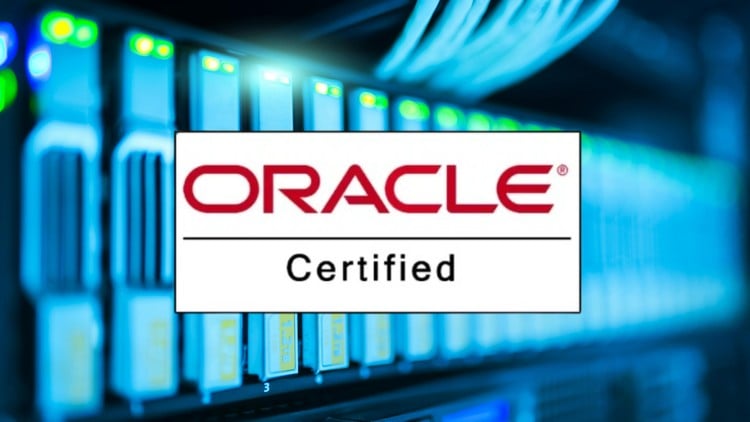
High-quality practice exams to boost confidence, identify weak areas, and prepare you for real test success
👥 31 students
Add-On Information:
Note➛ Make sure your 𝐔𝐝𝐞𝐦𝐲 cart has only this course you're going to enroll it now, Remove all other courses from the 𝐔𝐝𝐞𝐦𝐲 cart before Enrolling!
- Course Overview
- This program offers high-quality practice exams tailored for the Oracle Cloud Infrastructure Architect Professional certification.
- Designed to validate advanced skills in architecting, implementing, and operating robust OCI solutions.
- Focuses on complex, real-world scenarios and best practices for high availability, scalability, security, and cost optimization.
- Aims to boost confidence, identify weak areas, and thoroughly prepare candidates for the demanding professional-level exam.
- Goes beyond foundational knowledge, challenging participants with in-depth questions across all exam domains.
- Features detailed explanations for each practice question, clarifying concepts and reinforcing correct architectural approaches.
- Serves as a crucial final preparation step for experienced OCI professionals seeking expert certification.
- Equips candidates with strategic thinking to effectively approach scenario-based exam questions.
- Requirements / Prerequisites
- Extensive Hands-On OCI Experience: Significant practical experience with OCI services, including deployment, management, and troubleshooting, essential.
- Oracle Cloud Infrastructure Architect Associate Certification (Highly Recommended): A strong foundational understanding of OCI core services assumed, ideally validated by the Associate certification.
- Proficiency in Cloud Computing Concepts: Solid grasp of IaaS, PaaS, elasticity, fault tolerance, disaster recovery, and hybrid cloud models.
- Understanding of Networking Fundamentals: Core knowledge of VCNs, subnets, routing, security lists, Network Security Groups, VPN Connect, FastConnect, and DNS.
- Familiarity with Security Principles: Basic to intermediate understanding of IAM, data encryption, security posture management, and compliance considerations in OCI.
- Experience with Database and Application Deployment: Knowledge of OCI database services (e.g., DB Systems, Autonomous Database) and common application deployment strategies (e.g., load balancing, auto-scaling).
- Ability to Interpret Architectural Diagrams: Capacity to understand and analyze complex cloud solution designs and components.
- Familiarity with OCI Console and CLI: Comfort in navigating and interacting with OCI resources via graphical and command-line interfaces.
- Commitment to Self-Study: This practice-exam focused course requires self-driven review of underlying OCI documentation and concepts.
- Skills Covered / Tools Used (Implied through Exam Objectives)
- Advanced High Availability & Disaster Recovery: Designing multi-region/AD architectures, RTO/RPO strategies, cross-region replication, and failover mechanisms for workloads.
- Complex Networking Design: Implementing intricate VCN designs, advanced routing, hybrid cloud connectivity via FastConnect/VPN Connect, and secure network segmentation.
- Robust Security & Identity Management: Mastering advanced IAM policies, security zones, Cloud Guard, WAF, KMS, Data Safe, and ensuring compliance across OCI.
- Performance & Scalability Optimization: Architecting solutions for dynamic scaling, performance tuning of Compute, Storage, and Databases, leveraging advanced OCI services for throughput.
- Cost Management & Resource Governance: Implementing budgeting, cost analysis, resource tagging, and governance policies for cost-efficient OCI operations.
- Storage & Data Management Solutions: Selecting appropriate storage tiers (Block, Object, File, Archive), data lifecycle management, backup/recovery, and data migration.
- Database Architectures: Designing for various OCI database services (DB Systems, Autonomous, MySQL HeatWave, Exadata Cloud), including high availability, scaling, and application integration.
- Automation & Orchestration: Leveraging Resource Manager (Terraform), Events, Notifications, and SDKs for infrastructure as code and automated operations.
- Monitoring, Logging & Troubleshooting: Implementing comprehensive monitoring, centralized logging, and proactive alerting for operational insights and rapid issue resolution.
- Migration Strategies: Evaluating and planning for various cloud migration approaches (lift-and-shift, re-platform, re-factor) into OCI.
- Architectural Decision Making: Applying best practices to choose optimal OCI services for diverse business and technical requirements.
- Benefits / Outcomes
- Achieve Oracle Cloud Infrastructure Architect Professional Certification: Successfully pass the professional exam, validating your expert OCI architectural skills.
- Deepened OCI Architectural Expertise: Gain a deep understanding of advanced OCI design principles, best practices, and complex implementation scenarios.
- Enhanced Career Opportunities: Unlock senior architectural roles, consulting positions, and leadership opportunities in cloud solution design and management.
- Increased Confidence in Solution Design: Develop the ability to confidently design, propose, and implement highly available, scalable, and secure OCI solutions.
- Effective Troubleshooting and Optimization: Acquire diagnostic skills to optimize, and improve performance and cost-efficiency of existing OCI deployments.
- Become a Trusted Cloud Advisor: Establish yourself as a subject matter expert, guiding organizations through complex cloud transformations.
- Validation of Professional Competence: Provide tangible proof of your advanced OCI capabilities to employers and clients.
- Stay Ahead in Cloud Technology: Keep skills current and relevant in the rapidly evolving Oracle Cloud ecosystem.
- PROS
- Targeted Exam Focus: Designed for the OCI Architect Professional exam, ensuring efficient and relevant study.
- Identifies Weak Areas: Practice exams help pinpoint specific knowledge gaps for focused improvement.
- Builds Exam Confidence: Realistic simulations prepare candidates mentally for the exam environment.
- Efficient Study Path: Streamlines preparation, maximizing the effectiveness of study time.
- Validates Advanced Skills: A stepping stone to demonstrating expert-level OCI proficiency.
- CONS
- Assumes High Prior Knowledge: Not suitable for beginners; requires significant existing OCI experience and understanding.
Learning Tracks: English,IT & Software,IT Certifications
Found It Free? Share It Fast!